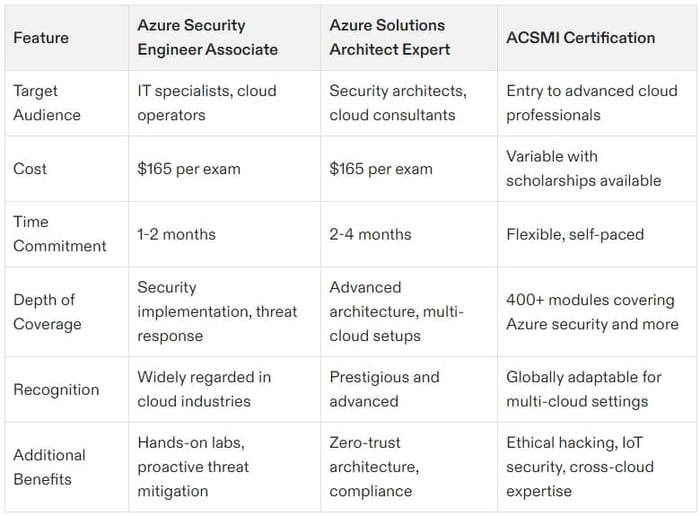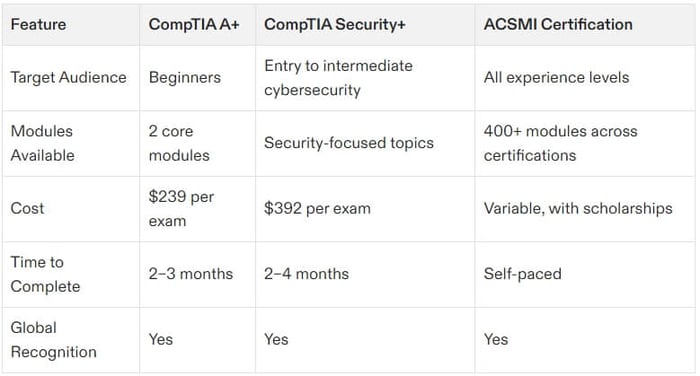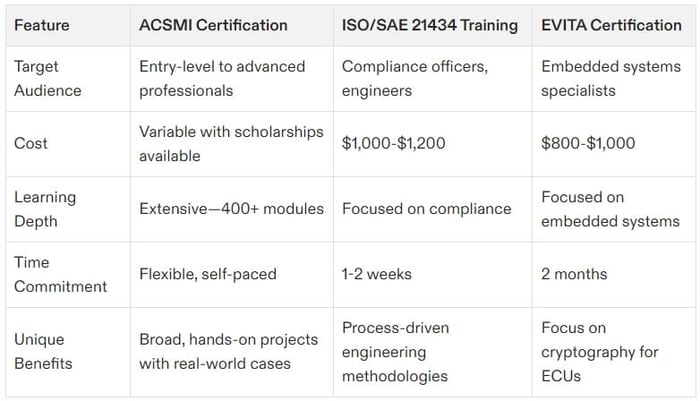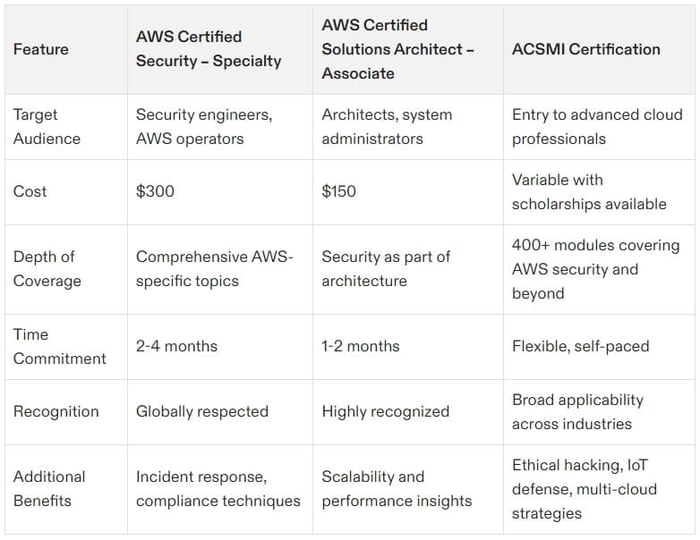Table of Contents
- Why Azure-Specific Cybersecurity Certifications Are Essential
- The Career Impact of Cybersecurity Certification Azure
- Benefits of Earning a Cybersecurity Certification Azure
- Top Cybersecurity Certification Azure Programs
- How to Prepare for Cybersecurity Certification Azure
- FAQs
- Certification Comparison Table
Microsoft Azure has cemented itself as one of the leading platforms in cloud computing, securing the trust of businesses, governments, and enterprises worldwide. With flexible infrastructure and embedded AI, Azure empowers innovation. However, this rapid adoption also makes it a prime target for cyberattacks. From data breaches to misconfigured firewalls, the need for experts in securing Azure environments is more pronounced than ever. This is where cybersecurity certification Azure becomes a critical asset for any professional looking to excel in cloud security. These certifications validate your expertise in defending digital assets on the Azure cloud. Whether you’re an IT specialist, security engineer, or developer, earning Azure-specific cybersecurity credentials can fast-track your career and bolster your skills in mitigating advanced cyber threats.
Why Azure-Specific Cybersecurity Certifications Are Essential
Cloud adoption has skyrocketed, and along with it, so have cyber risks. Organizations rely on third-party platforms like Azure to host critical operations, but improper security configurations or poor IAM practices often lead to loopholes that attackers exploit. Examples include exposed databases or vulnerabilities in virtual machines.
A cybersecurity certification Azure equips you with the tools and knowledge to overcome these challenges. By learning Azure-native features like Azure Security Center, Advanced Threat Protection (ATP), and Microsoft Defender for Cloud, you can secure cloud environments against increasingly sophisticated threats.
The Importance of Cloud Security Certifications
- Rising Threats: Cybercrime is expected to cost businesses $10.5 trillion globally by 2025. Specialized cloud knowledge is critical for addressing this growing landscape.
- Hybrid Environments: Many enterprises use Azure for hybrid setups, requiring certified professionals to manage both on-premises and cloud-based security.
- Regulatory Compliance: Azure implementations must often align with standards such as GDPR, HIPAA, and ISO 27001. Certification ensures you’re proficient in compliance.
- Proactive Security Measures: Unlike reactive IT security, Azure certifications teach you proactive measures for threat detection, like utilizing Azure Log Analytics for anomaly detection.
The Career Impact of Cybersecurity Certification Azure
Azure certifications don’t just validate technical knowledge—they position you as a trusted expert in securing an organization's most critical assets. Whether you’re transitioning into cloud security or looking to step up from a generalist IT role, these credentials offer a career boost.
Career Roles You Can Pursue
- Azure Security Engineer: Configure and implement security controls across hybrid platforms.
- Cloud Security Architect: Design Azure-based systems while prioritizing confidentiality, integrity, and availability.
- Cybersecurity Analyst: Use tools like Microsoft Sentinel and Azure Log Analytics to monitor and respond to threats.
- Compliance Specialist: Help organizations adhere to regulatory standards using Azure Compliance Manager.
- Penetration Tester: Test Azure environments for vulnerabilities using tools like Kali Linux or Azure-native solutions.
Explore Azure-specific certifications and beyond through ACSMI to future-proof your career.
Benefits of Earning a Cybersecurity Certification Azure
1. Master Azure-Specific Tools
Unlike generic certifications, Azure-focused credentials teach you platform-specific tools. You'll learn about Azure Key Vault for encryption management, Azure Defender for IoT security, and more.
2. Stay Ahead of Cloud Trends
Azure certifications keep you updated on the latest advancements, from AI-enhanced threat detection to zero-trust architecture.
3. Gain Global Recognition
Microsoft certifications are respected across industries, instantly boosting your credibility as a qualified professional.
4. Improved Career Prospects
Azure-certified individuals are in high demand, commanding higher salaries and better roles. Certifications help unlock opportunities like becoming a Cloud Security Consultant or Solutions Architect.
5. Organizational Impact
Certified professionals strengthen organizations by creating robust cloud defenses, thereby reducing downtime and instilling confidence among stakeholders.
Top Cybersecurity Certification Azure Programs
1. Microsoft Certified: Azure Security Engineer Associate
This certification is ideal for those looking to master core Azure security principles, including securing identities, data, and networks. Key modules include implementing role-based access control and securing hybrid clouds.
2. Microsoft Certified: Azure Solutions Architect Expert
This advanced certification is perfect for professionals designing secure Azure environments. Focus areas include virtual networking, secure app design, and scaling effectively.
3. ACSMI Certification
For those wanting a broader perspective, ACSMI (Advanced Cyber Security Mastery Institute) offers a certification with 400+ modules covering cybersecurity certification Azure and beyond. Whether you’re working on Azure-native features or tackling multi-cloud strategies, ACSMI ensures you develop expertise that’s future-proof.
Learn more about ACSMI certifications designed to enhance your mastery in Microsoft Azure cybersecurity and more.
How to Prepare for Cybersecurity Certification Azure
Hands-On Labs
Practice applying what you’ve learned with Azure’s online labs, focusing on setup and mitigation exercises.
Microsoft Learn Platform
Use the extensive, free resources provided by Microsoft to access interactive learning paths for each certification.
ACSMI Resources
ACSMI’s 400+ modules offer in-depth understanding with case studies and real-world scenarios tailored to Azure-specific challenges.
FAQs
1. What is a cybersecurity certification Azure?
It’s a specialized credential focused on securing the Microsoft Azure cloud environment, teaching threat mitigation, compliance strategies, and secure architecture development.
2. Who benefits from these certifications?
IT professionals, cybersecurity analysts, engineers, and anyone managing cloud-based infrastructure can benefit.
3. How is Azure security different from AWS or GCP?
While all cloud providers emphasize security, Azure-specific certifications focus on Microsoft-native tools like Azure Security Center and AD privileges, which differ from the ecosystems in AWS or GCP.
4. Is it worth pursuing ACSMI certification alongside Azure certifications?
Absolutely. ACSMI broadens your scope with multi-cloud strategies while specializing in Azure modules, making it complementary to Azure certifications.
5. How much time does it take to earn a cybersecurity certification Azure?
Entry-level certifications take 1-2 months, while advanced ones require 3-4 months depending on your commitment.
6. Is prior cloud experience necessary?
For basic-level certifications, prior experience isn’t mandatory, but advanced certifications like Azure Solutions Architect require foundational knowledge.
7. Are Azure certifications recognized globally?
Yes, Microsoft certifications have worldwide recognition and are highly sought after by enterprises.
8. What career opportunities open up with Azure cybersecurity certification?
You can explore roles like Cloud Security Engineer, Solutions Architect, and Cybersecurity Consultant.
Explore ACSMI modules on Azure certifications to empower your growth.
Certification Comparison Table
When charting your career path, consider how cybersecurity certification Azure can elevate both your skills and your appeal to potential employers.
Microsoft Azure is reshaping how organizations manage their data and operations, but with great power comes enormous responsibility. By earning a cybersecurity certification Azure, you’ll not only secure your future but also play a pivotal role in protecting the backbone of modern enterprises’ digital infrastructure. Take the next step today, and become the security expert companies need in this cloud-driven age!





